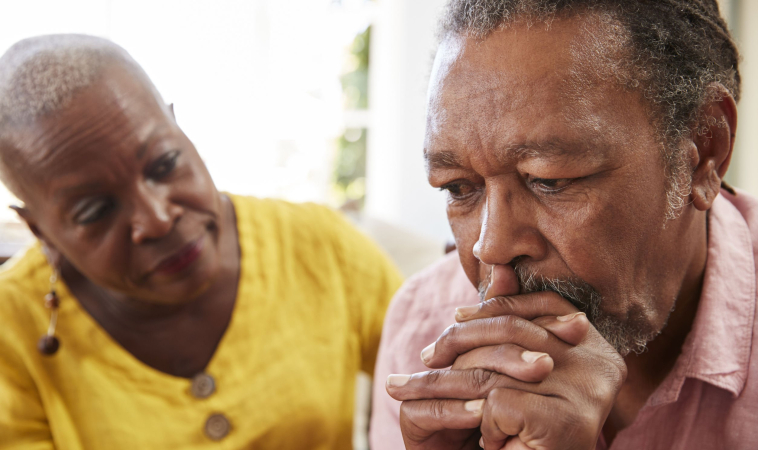A spouse requiring caregiving for chronic illness or a disability can create a stressful environment for married couples.
The toll, however, is more pronounced for care-receiving husbands–compared to wives or men in non-caregiving relationships–who are vulnerable to negative exchanges with their spouses, such as criticizing or letting them down, due to guilty feelings and depression, a new study shows.
Researchers analyzed how negative spousal exchanges can have a major impact on caregiving couples
Researchers at the University of Michigan and Daegu University in South Korea analyzed how negative spousal exchanges can have a major impact on caregiving couples and their mental health.
Studies like this one, published in the Journal of Social Personal Relationships, are important in shedding light on equity among older couples as they cope with changes in roles and responsibilities, said Berit Ingersoll-Dayton, U-M professor emerita of social work.
Thus, if a person receives more than given, the individual is likely to feel guilt and shame. When the opposite happens–more is given than received–anger and resentment by the caregivers are possible outcomes, she said.
How the study was conducted
Ingersoll-Dayton and colleague Minyoung Kwak of Daegu University used data comparing three groups: couples who did not provide or receive care, couples in which husbands received care from their wives, and couples in which the wives received care from husbands. They tested for gender differences within more than 3,500 couples in which at least one spouse was older than 51 years of age.
When compared with husbands who didn’t receive any care or those who provided care to their wives, care-receiving husbands showed more depressive symptoms. This may be because negative reactions from spouses cause husbands to feel that they are a burden.
For caregiving husbands
For caregiving husbands, their work didn’t moderate the association between negative exchanges with spouses and depressive symptoms.
“Because spousal caregiving is not a traditional role for husbands, caregiving husbands often receive affirmation” when doing the work, as well as praise from others, said Kwak, the study’s lead author.
Among wives, there were no significant differences in the effect of negative exchanges with husbands on the wives’ depressive symptoms across care status. The negative exchanges with husbands are similar for wives regardless of whether or not they are in a caregiving relationship, the study showed.
“Due to wives’ long-standing patterns of providing care in the family throughout the marriages, spousal care may not generate significant differences in exacerbating inequitable relationships among wives,” Minyoung Kwak of Daegu University
For caregiving wives
That is, caregiving wives are less susceptible to the adverse effects of negative social exchanges with husbands than non-caregiving or care-receiving wives because they have already experienced and practiced caregiving duties in their marriage.
Source:
- Kwak, M. & Ingersoll-Dayton B. (2019) Relationships between negative exchanges and depressive symptoms in older couples: The moderating roles of care and gender. Journal of Social and Personal Relationships. doi.org/10.1177/0265407519879504
 Razi Berry is the founder and publisher of the journal Naturopathic Doctor News & Review, which has been in print since 2005, and the premier consumer-faced website of naturopathic medicine, NaturalPath. She is the host of The Natural Cancer Prevention Summit and The Heart Revolution-Heal, Empower and Follow Your Heart, and the popular 10 week Sugar Free Summer program. From a near death experience as a young girl that healed her failing heart, to later overcoming infertility and Chronic Fatigue Syndrome and Fibromyalgia through naturopathic medicine, Razi has lived the mind/body healing paradigm. Her projects uniquely capture the tradition and philosophy of naturopathy: The healing power of nature, the vital life force in every living thing and the undeniable role that science and mind/body medicine have in creating health and overcoming dis-ease. Follow Razi on social media: Find her on Facebook at Razi Berry, on Instagram at Razi.Berry, join her Love is Medicine group to explore the convergence of love and health, and find more Love is Medicine podcast episodes here.
Razi Berry is the founder and publisher of the journal Naturopathic Doctor News & Review, which has been in print since 2005, and the premier consumer-faced website of naturopathic medicine, NaturalPath. She is the host of The Natural Cancer Prevention Summit and The Heart Revolution-Heal, Empower and Follow Your Heart, and the popular 10 week Sugar Free Summer program. From a near death experience as a young girl that healed her failing heart, to later overcoming infertility and Chronic Fatigue Syndrome and Fibromyalgia through naturopathic medicine, Razi has lived the mind/body healing paradigm. Her projects uniquely capture the tradition and philosophy of naturopathy: The healing power of nature, the vital life force in every living thing and the undeniable role that science and mind/body medicine have in creating health and overcoming dis-ease. Follow Razi on social media: Find her on Facebook at Razi Berry, on Instagram at Razi.Berry, join her Love is Medicine group to explore the convergence of love and health, and find more Love is Medicine podcast episodes here.

















